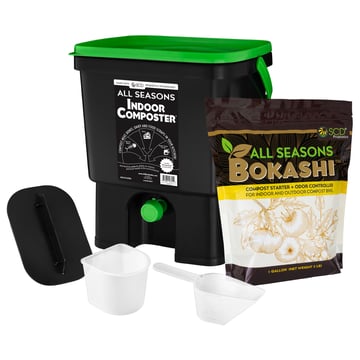Food Waste: A Global Problem that Needs Immediate Attention
Food waste is a critical issue affecting both the environment and the economy. Every year, billions of tons of food are thrown away, leading to a significant loss of resources, increased greenhouse gas emissions, and negative impacts on the world's population. But how big is the problem and what can be done to address it? We'll see the data and explore some options in this blog.
Food Waste by the Numbers
According to the United Nations Food and Agriculture Organization (FAO), about one-third of the food produced globally every year, which is equivalent to 1.3 billion tons, is lost or wasted. Representing an enormous economic loss of $940 billion annually which could feed three billion people. Food waste is mostly from retailers and consumers or caused by poor infrastructure and supply chain management. In the United States alone, food waste accounts for ~30-40% of the food supply. Roughly 133 billion pounds or $161 billion worth of food annually, coming mostly from households, restaurants, grocery stores, and farms.
-1.png?width=617&height=412&name=MicrosoftTeams-image%20(1)-1.png)
Food Waste and the Environment
Food waste directly affects the environment. When food is discarded, it ends up in landfills where it breaks down and releases methane, a 28-times more potent greenhouse gas than carbon dioxide that contributes to climate change due to its heat-trapping ability. Reducing food waste will be a valuable tool in mitigating climate change as well as maximizing our resources as food waste represents a waste of resources such as water, energy, and land.
What Can Be Done to Reduce Food Waste?
 One effective method is to compost food waste using a bokashi composting system that involves fermenting food waste with bokashi microbes, which helps to break down the waste quickly and efficiently while preventing odors and pests. At SCD Probiotics, we have an All-Seasons Indoor Composter Kit - with All Seasons Bokashi to get you started recycling any kind of organic material. Easily lower your carbon footprint with our All-Seasons Indoor Composter + All Seasons Bokashi to ferment your food waste after every meal.
One effective method is to compost food waste using a bokashi composting system that involves fermenting food waste with bokashi microbes, which helps to break down the waste quickly and efficiently while preventing odors and pests. At SCD Probiotics, we have an All-Seasons Indoor Composter Kit - with All Seasons Bokashi to get you started recycling any kind of organic material. Easily lower your carbon footprint with our All-Seasons Indoor Composter + All Seasons Bokashi to ferment your food waste after every meal.
Other ways that can be explored to reduce food waste include:
- Planning meals and shopping with a grocery list.
- Storing food properly to extend its shelf life.
- Donating surplus food to food banks or charities.
- Using food scraps in creative ways, e.g., making vegetable broth or using fruit peels to make candy.
- Encouraging retailers and restaurants to donate excess food to local organizations.
Food waste is a global problem that requires immediate attention. With the magnitude of the problem, we all share a responsibility to take urgent action. Let us do our part in the comfort of our homes with SCD Probiotics' ready-start kit. This is all you need to start making a positive impact on the environment and the economy.